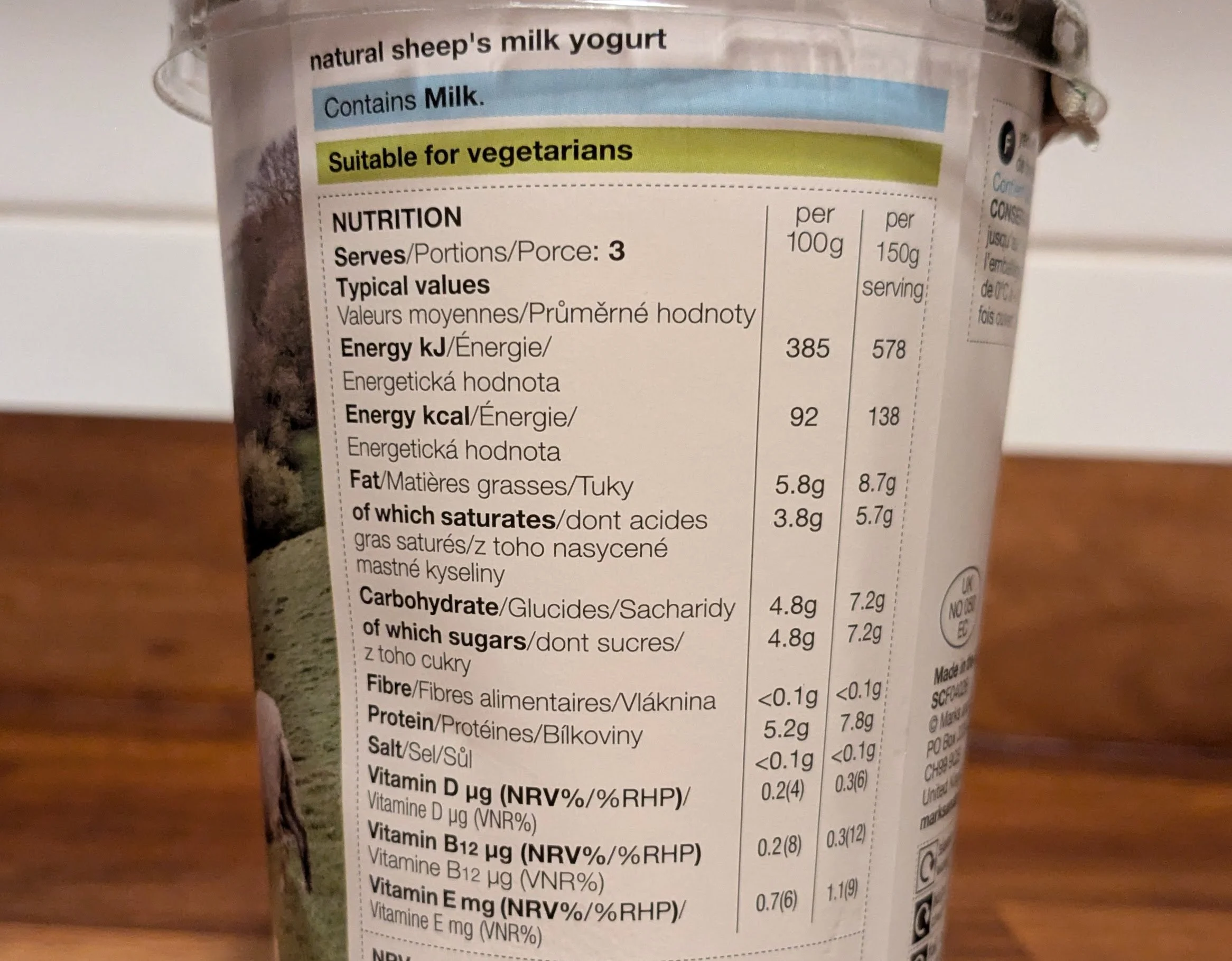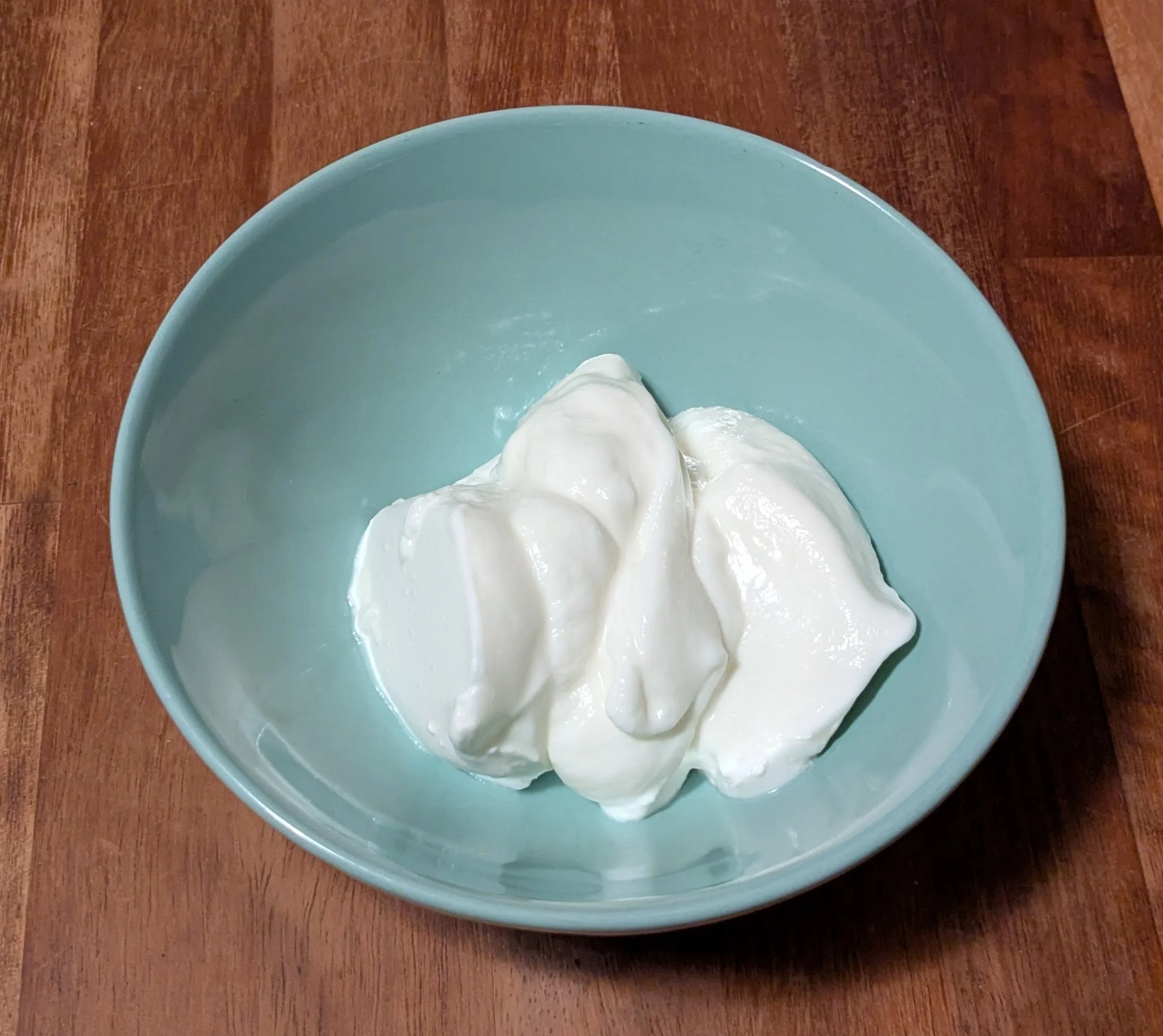M&S sheep's milk yoghurt review
Here we will give a hands-on, taste-tested review of M&S sheep's milk yoghurt. We’ll look into the benefits, ingredients, nutrition, use and flavour of this sheep’s milk yoghurt. We’ll also compare some key factors against a popular cow’s milk yoghurt.
This yoghurt is available in M&S stores in the UK.
You might also be interested in reading our article on the best probiotics in the UK if you want to add more healthy microbes to your diet.
Ingredients of M&S sheep's milk yoghurt
Because UK law allows single-ingredient products not to state ingredients, there is no listed ingredients on the tub.
This is good because it means that this yoghurt is clean and simple and only contains sheep’s milk and live cultures.
On the downside it means they don’t list which live cultures they have used to ferment it. More on this below.
In summary, it’s a very clean and natural yoghurt. And it is made in the UK with British milk.
Our favourite gut health products in the UK
YourBiology Gut+ probiotic not only offers 10 strains of probiotics, but also includes two types of prebiotics, three digestive enzymes and vitamin D for gut health support. All this means it offers a lot more benefits for gut health and general health than most probiotic supplements do
Healthpath gut health test is the UK’s most comprehensive gut health test. It tests over 100 biomarkers, checks your digestion and immune response, analyses leaky gut and provides a clear and understandable report on your microbiome
YourBiology SuperGreens+ is a superfood and greens supplement which makes it very easy to get a huge amount of nutrition - vitamins, minerals, amino acids, fibre, polyphenols and more - in one glass. Great for supporting gut health, skin health, energy, mental clarity and immunity.
Read more about the best gut health products in the UK.
Benefits of M&S sheep's milk yoghurt
Sheep’s milk has a different nutrient profile to cow’s milk and offers some unique benefits. For context, we’ll compare a few factors against Tesco Greek style yoghurt which is a popular cow’s milk.
Live cultures
Probiotics are live, beneficial microorganisms that have been proven to support health. They are a specific type of live culture.
Unfortunately there is no indication of the types of live cultures present in this yoghurt, so we don’t know whether the live cultures can be considered probiotic or not.
In terms of the amount of actual live cultures present (ie colony forming units), again no information is provided.
For context, Tesco also doesn’t give any information regarding the live cultures included or the amount of them.
Read more about the benefits of probiotic foods.
Postbiotics
Postbiotics are essentially beneficial things cultures can produce during fermentation.
Here are the main postbiotic compounds typically present in yoghurt after fermentation:
Lactic acid – lowers pH, inhibits pathogens, aids lactose digestion
Short-chain fatty acids (SCFAs) – such as acetate which supports microbial balance, helps control inflammation and indirectly nourishes the gut lining by feeding butyrate-producing bacteria
Exopolysaccharides (EPS) – carbohydrate polymers that can modulate immunity and support the gut barrier
Bioactive peptides – released from milk proteins; some have antihypertensive, antimicrobial or antioxidant effects
Easier to digest
Sheep’s milk has a higher proportion of A2 β-casein and less αs1-casein than cow’s milk. These differences lead to a softer, finer curd which enzymes break down more easily. This means many people who feel bloated with cow’s milk yoghurt find sheep’s milk yoghurt gentler.
Higher in key vitamins and minerals
Sheep’s milk provides more calcium, phosphorus and zinc than cow’s milk, plus higher levels of riboflavin and vitamin B12. These nutrients support bone health, enzyme function and energy metabolism.
More protein
Sheep’s milk typically contains more protein than cow’s milk. This also means sheep’s milk provides better satiety.
Nutrients
This yoghurt generally compares well against Tesco Greek style yoghurt.
Fat: This sheep’s milk yoghurt has moderate fat levels with 5.8% fat - which is below Tesco’s level of 7.5%. It’s also worth stating that many Greek style cow’s milk yoghurts have around 10% fat.
Protein: It has good protein levels at 5.2% - which is significantly higher than Tesco’s level of 3.7%.
Sugar: This yoghurt has moderate to high sugar levels (for an unflavoured yoghurt) at 4.8% - which is above Tesco’s level of 4.2%.
Calcium: Unfortunately neither brand provide this information.
Appearance
As the picture below shows, it has a glossier, sloppier appearance than cow’s milk yoghurt.
Texture
The texture is decently thick and is best described as slimier and stickier than cow’s milk yoghurt. This is evidenced by when you pick up some yoghurt with a spoon you get a thin connective strand forming, lengthening and then breaking - which you wouldn’t get with cow’s milk yoghurt.
Flavour
Its aroma is quite neutral and not too dissimilar to cow’s milk. It is less sheep-y than I was expecting.
The taste is also quite mild and not too sheep-ish. There’s a nice buttery character to it. And it has a high acidity.
Overall, the taste is good and not as strong as I had feared. It’s the slightly slimy texture which takes a bit of getting used to.
Use
This yoghurt would be quite versatile. It could be had on its own, added to smoothies or put on cereal.
It might also work in a dressing or marinade.
Cost of M&S sheep's milk yoghurt
You can buy a 450g tub from M&S for £3.80 - which is certainly a premium price.
Review summary
Rating: 4.25 stars out of 5.
Verdict: M&S sheep's milk yoghurt has a nice flavour, but a texture which some might find unappealing. Being from sheep’s milk, it provides some advantages over cow’s milk yoghurt related to digestion and nutrients. It is expensive though.
Pros
simple, natural ingredients
versatile
higher in some vitamins and minerals compared to cow’s milk
easier to digest for some people than cow’s milk
good protein levels
nice, approachable flavour
Cons
slimy texture is a bit troubling at first
premium price
no information on the live cultures included
no information on the actual amount of live cultures it contains (ie colony forming units)
Now read our article about the best yoghurt in the UK!
Health benefits of yoghurt
Aside from the specific benefits listed above, especially related to probiotics and postbiotics, yoghurt has some other important health benefits.
Vitamins and minerals
Yoghurt is a source of various vitamins and minerals including:
calcium - which helps digestion and supports bone and teeth health
magnesium - which supports bone health, muscle function and energy production
phosphorus - which is important for bone and teeth health and energy metabolism
potassium - which supports heart, muscle, nerve and kidney health
vitamins B2 and B12 - which support immunity, energy production and cell and nerve function
vitamin A - supports vision, immune function, cell growth and healthy skin
Satiety and weight management
The high protein and low carbohydrate content in yogurt, especially Greek style yogurt, helps you feel fuller for longer which can help control your appetite. Greek yoghurt is often recommended by dietitians for this reason.
Reduced lactose
Compared to unfermented dairy products such as milk, yoghurt has lower levels of lactose as this is partially consumed by bacteria during the fermentation process. This makes it more digestible for people who have some degree of lactose intolerance.
Factors we consider in our ratings
The factors we consider when doing a review (and the weightings of each of these) may vary depending on the product we are testing, but here are the key general factors we consider when we settle on a rating for a product.
Health benefits
We find out how the product will be good for your health and outline the benefits for you in simple language. This often involves doing research so you don’t have to. We often link to scientific studies or articles summarising scientific findings so you can dig deeper if you want to.
Things detrimental to health
We want to highlight where a product might include something bad for your health - even if the product might be good for you in another way. This could include such things as pointing out certain additives it contains or high sugar levels.
How it’s made
This will vary depending on the product, but we want to see a quality process for making it and quality ingredients. For example, we want to see a kombucha traditionally fermented with lots of different microbial strains and we want to see a yoghurt made with fresh milk and not milk powders.
Price
While we expect quality products to be more expensive, they still have to be priced within reason. On the other side of things, a product which is priced very competitively will get a ratings boost based on the value it provides.
Flavour
For some products flavour won’t be a factor (eg probiotic tablets), but for others, like yoghurt or kimchi, flavour is a key aspect because these products are made to be enjoyed as well as being healthy! We will try to be as subjective as possible and describe the flavour in detail so you can get an idea of whether you would like it or not.
Our favourite gut health products in the UK
YourBiology Gut+ probiotic not only offers 10 strains of probiotics, but also includes two types of prebiotics, three digestive enzymes and vitamin D for gut health support. All this means it offers a lot more benefits for gut health and general health than most probiotic supplements do
Healthpath gut health test is the UK’s most comprehensive gut health test. It tests over 100 biomarkers, checks your digestion and immune response, analyses leaky gut and provides a clear and understandable report on your microbiome
YourBiology SuperGreens+ is a superfood and greens supplement which makes it very easy to get a huge amount of nutrition - vitamins, minerals, amino acids, fibre, polyphenols and more - in one glass. Great for supporting gut health, skin health, energy, mental clarity and immunity.
Read more about the best gut health products in the UK.
Your reviewer
This article was reviewed by Travis, the founder of this website, long-time gut-health enthusiast, science nerd and passionate kombucha maker of over 10 years!






